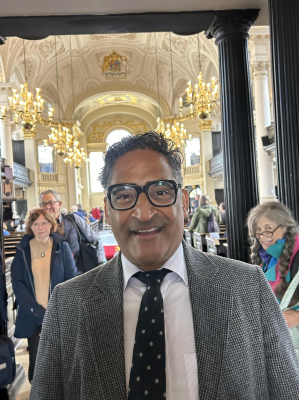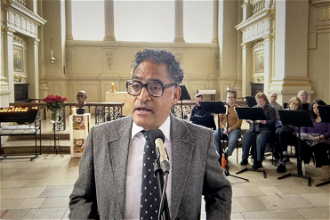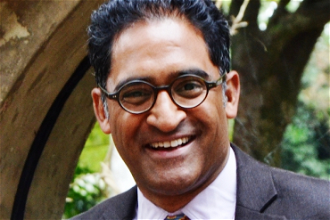Text: Dr Raymond Perrier at London St Oscar Romero service

Dr Perrier. Image: ICN/JS
Dr Raymond Perrier, Director of the Denis Hurley Centre in Durban, South Africa, gave the following address during the Ecumenical Service to mark the 44th anniversary of the martyrdom of St Oscar Romero at St Martin in the Fields, Trafalgar Sqhaere, London on Saturday, 16 March 2024.
Prayerful and Prophetic Resilience in the Face of Injustice
We have, in the figures of St Oscar Romero of El Salvador and Denis Hurley of Durban, South Africa, two 'golden arches'. Two men who used their position as archbishops in the Catholic church to be 'a voice for the voiceless'. They operated on different sides of the planet; while Hurley was a leading figure in the Second Vatican Council in the 1960s, Romero was relatively unknown outside his home country until his death; and while Romero was an archbishop for under three years, Hurley was a bishop for almost 60 years. Yet there are some remarkable similarities between their lives.
Being of similar age, they both studied for the priesthood in Rome in the 1930s. Frustratingly we cannot prove that they ever met, though Hurley in his memoirs assumes that they must have attended the same lectures. What we do know is that they had a shared experience of seeing the rise of fascism in Italy and then the conflicted response of the Church in the face of political intimidation. They both spent part of their lives training future priests - really quite bookish men who were unlikely revolutionaries. The appointment of each of them to high office in the Church was surprising, though for different reasons: Romero was chosen because he was the quiet man who had been a rural bishop and, it was thought, would not rock the boat; Hurley, when he was appointed in 1947, was absurdly young: in fact at 31 he was the youngest bishop in the entire Catholic world.
But once they were in charge of dioceses, both had the experience of being conscientised by their own people and most especially by the poor and marginalised. Romero broke the conventions of the strictly classist Salvadoran society by mixing with peasants and listening to their experiences. There are moving photos on the Romero Trust website of him walking the streets, or sharing a meal with ordinary families, to connect with the lives of his people. Hurley broke the even stricter laws of Apartheid South Africa by reaching out to citizens of all colours and hearing at first hand what injustices and daily humiliations they faced. Hurley also broke the equally strict conventions of his Church at the time by listening to and empowering lay people, women, Christians of other denominations and people of other faiths.
By walking alongside their people, these bishops learnt about the exclusions, oppression and violence that was happening in their countries and that so many other leaders - political and religious - chose to ignore. They thus both became icons in the struggle against injustice having the courage to use the platform they had to speak out in a divided society. And what they said was often not what people wanted to hear. Of course, that deafness is still true today and we just sang Hurley's own words in the hymn: "We humbly ask your pardon, Lord: the ones who hear are all too few."
For their stand against injustice, both archbishops faced intimidation and vilification, a cool reception from members of their church, from their fellow bishops and even from Rome, and warnings from their governments of legal actions and death threats. Romero of course did not survive these. He was assassinated while saying Mass almost exactly 44 years ago on 24 March 1980 - the blood of the chalice mixing with his own blood in the supreme image of martyrdom. Hurley was spared such violence and lived to see the transition to a democratic South Africa; he died 20 years ago, in his 90th year.
In both these men we see a prophetic stance but importantly it is a prophetic stance that is rooted in prayer and in Scripture. There is a lovely story told of a group of young revolutionary-minded trainee priests in San Salvador, creeping out of the seminary to campaign on the streets, and passing an old priest who was on his knees praying in the chapel. They mocked him wondering why he could not be more like their great hero the activist Archbishop Romero. And then the old priest stood up and turned around and it was indeed Archbishop Romero.
Through all their actions, Romero and Hurley were doing no more - and no less - than Jesus proclaims in his first public sermon as recounted in Luke chapter 4. Jesus enters the synagogue in Nazareth, takes out the scroll and reads from the prophet Isaiah: "The Spirit of the Lord is upon me; he has anointed me." Hurley chose as his episcopal motto a phrase from 2 Corinthians which we have just heard read: "Where the Spirit is, there is Freedom". And it is in the power of that anointing by the Spirit that Hurley and Romero find freedom and were able to show others the way to freedom. It is the freedom to preach good news to the poor, to liberate captives, to open the eyes of the blind, to bind up the broken hearted.
Both Hurley and Romero used their pulpits, and used the media available to them, to preach good news to the people of their own countries. Both men also benefited hugely in their ministry from the support of CAFOD and Christian Aid to make sure that the truth of what was happening was heard further afield. As we heard from Romero's words earlier:
"It is not enough to demand justice. The civilisation of love also demands truth…and truth is what is lacking in our situation…When the truth is spoken it gives offence, and the voices that speak the truth are silenced."
Romero was silenced by his assassination but, as he had predicted: "they may kill an archbishop, but I will rise again in the Salvadoran people". Hurley was also fearless in witnessing to the truth, often standing on his own outside Durban City Hall holding a placard and daring the authorities to arrest him. He was also supremely creative in how he could use the power of religious symbols to tell the truth to the world. Let me give one example.
At the height of the state of emergency, in March 1985, a group of anti-Apartheid activists had been detained without charge in the central prison in Durban and Hurley wanted to show solidarity with them. Strictly speaking it was illegal for him even to mention that they were detained, let alone organise any kind of public demonstration. His great lieutenant, a lay man called Paddy Kearney, came to Hurley with an idea. "Is it not, your Grace, an ancient tradition of the church that a bishop should be able to visit his congregants on Good Friday?". "Is it?" asked Hurley; "well," Paddy replied, "it is an ancient tradition: who knows?"
So Hurley went to the Chief of Police and explained this ancient tradition to him and the Chief of Police, a loyal member of the Dutch Reformed Church, felt he could not refuse. But then Hurley explained that, since not all the detainees were Catholic, the Anglican bishop and the Methodist and the rest should also be allowed to visit the prison. And so, at dawn on Good Friday, Hurley led a group of fellow Christian leaders into the jail so that they could pray with the detainees; meanwhile a group of other Christians who had by coincidence turned up at the same time stood in a circle around the prison and sang hymns so the prisoners would know they were not forgotten. And then they all walked away in complete silence, so they did not break the rules on public protests.
This was not a protest but a prayer service - a prayerful and prophetic witness - that comforted the afflicted inside the prison and afflicted the comfortable forces of the Apartheid regime. That tradition of a silent ecumenical walk of witness at dawn on Good Friday continues to this day and we will be marking it in central Durban in two weeks' time.
The ecumenical nature of that event is worth noting in this wonderful ecumenical service. We should remember that Romero was honoured by Westminster Abbey many years before he was canonised by Rome. Long before it was encouraged, or even allowed, for Catholics to mix with 'our separated brothers and sisters', Hurley was reaching out to Christians of other denominations and indeed to people of other faiths since Durban has sizeable Muslim and Hindu communities. One of his great collaborators was Ela Gandhi, grand-daughter of the Mahatma. I am proud to say that the Denis Hurley Centre in Durban is located between the Catholic Cathedral, the largest mosque and the site of Mahatma Gandhi's law office. We are, as far we know, the only building in the world named after a Catholic archbishop which houses a halal kitchen so we can work together with all faiths to feed the poor.
If Isaiah calls us to bind up the broken-hearted, then every act of ecumenical or interfaith collaboration is an opportunity to bind up the broken heart of the one God who created us all.
Romero did not live to see liberation in El Salvador - it came after his death. But he also did not live to see how that liberation would later be squandered by politicians who once fought for the poor and now ignore their plight and feather their own nests. Hurley did live to see liberation with South Africa's first democratic elections 30 years ago in 1994 - that was a moment celebrated especially here in Trafalgar Square where for so many years there had been a valiant protest outside South Africa House next door to us. But Hurley died before the pot of gold in the rainbow nation was found to be empty - stolen by members of a party that claimed to be the liberators or sold by businesses and political leaders to the highest bidder.
Romero and Hurley might have hoped that their successors as religious leaders in El Salvador or South Africa (or even here in Britain) would have continued the fight against injustice with the same vigour. And some of them do; but by no means all. Can we put our hands on our hearts and say that we have - to use Hurley's words from 1960 - 'a true social apostolate, a systematic effort to concentrate the energies of divine light and life on the failings of human conduct'?
Because, of course, the anointing that Jesus mentions in Luke 4 is and not for just for him or for Romero and Hurley. Each one of us by our baptism has been anointed; the Spirit of the Lord is on each one of us and the manifesto of Isaiah should be the manifesto of all our lives. So what does this mean for us sitting here today?
We heard Hurley's words from 64 years ago reminding the Church that in a bitterly divided community, its mission is one of salvation. And that while we can hope to draw on the strength of God, we have to constantly be aware of - and challenge - the weakness of humans, starting with our own frailty.
In El Salvador and in South Africa today the work of bringing good news to the poor is far from over. I would suggest that the same is true of the bitterly divided nation which looks to this square as the epicentre for celebration and for protest. The over-riding need for that good news is something I see every day in central Durban at the Denis Hurley Centre. It is a place where people of all faiths come together to serve the homeless, refugees, drug users, the unemployed - the captives of our economic system who are looking to be liberated. So many wonderful parallels to the work of St Martin in the Fields. Occasionally, especially when there is an election coming up, government with its massive resources does remember that these are the poor and marginalised whom Hurley and others fought valiantly to liberate from Apartheid. But more often than not, the poor are forgotten by the South African government because (to use Hurley's words) of "the slowness or the failure or the refusal of humans to respond to the call of God."
In the face of increasing injustice and indifference - in El Salvador, in South Africa or here in Britain - one temptation for people of faith is to retreat. But as Romero put it: "To pray and wait for God to do something is not holiness, it is laziness." We are all anointed and called to constantly find ways, small and large, to bring good news to the poor, to bind up the broken hearted and to open the eyes of the blind - starting with opening our own eyes and then encouraging others to see what they would rather ignore.
Another temptation is to be committed to act but then to wait for the perfect moment. In Luke 4 we are told of the year of the Lord's favour - that sounds like a great time to act and until then we should just wait, shouldn't we? Clearly, Romero did not live to see the year of the Lord's favour: but he did what he could when he could and entrusted the rest to God: accepting that he was a worker not the master builder. In South Africa with the elections 30 years ago it looked as if we had reached that Kairos moment - the year of the Lord's favour. But of course 1994 was just the start of another mountain and at the Denis Hurley Centre we are very aware that we still have a long way to climb. The example of the lives of Romero and Hurley remind of what Jesus tells us in Luke 4: there is no excuse for waiting: for now is the acceptable time, now is the day of the Lord's salvation.
Watch a recording of the service here: www.facebook.com/watch/live/?ref=watch_permalink&v=7334064290005715

















